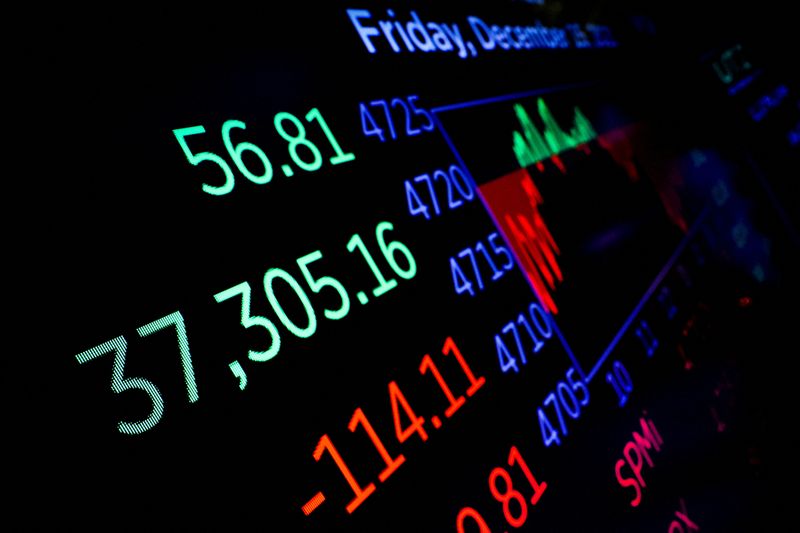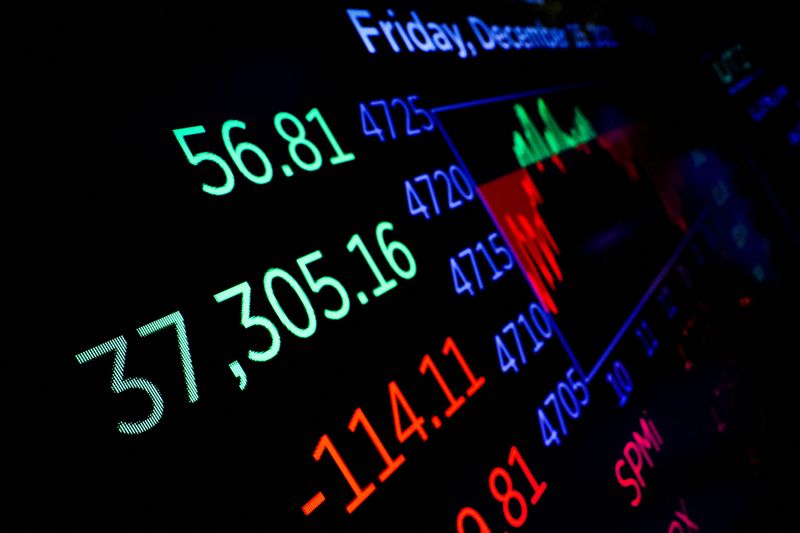Stock Markets
Markets in 2023: Soaring stocks and roaring bonds defy the doubters


© Reuters. FILE PHOTO: A screen displays the Dow Jones Industrial Average after the closing bell on the floor at the New York Stock Exchange (NYSE) in New York City, U.S., December 15, 2023. REUTERS/Brendan McDermid/File Photo
By Marc Jones
LONDON (Reuters) -This year might go down as one of the most unusual ever in financial markets – mainly because everything seems to have come good despite a lot of turbulence and many predictions turning out to be wrong.
Take equity markets. World stocks are nearly 20% higher despite the highest interest rates in decades and a mini crisis that wiped out one of Europe’s best known banks – Credit Suisse – along with a few smaller ones in the U.S.
In the bond markets, just a few months ago investors were expecting the Fed & Co to raise rates and leave them there while recessions rolled in. Now bond markets are looking to central banks to embark on a rate-cutting spree with inflation apparently beaten.
Other areas of the markets have experienced wild gyrations that are hard to explain. is up 150% on the year. Some of the most beaten up emerging market bonds have achieved triple-digit gains. The “magnificent seven” tech giants have seen a 99% surge in their shares over the year.
“If you’d told me at the start of year that we would have a U.S. regional banking crisis and Credit Suisse would cease to exist, then I’m not sure we would have guessed that we would see the year we’ve had for risk assets,” PIMCO’s CIO for Global Fixed Income, Andrew Balls, said.
The result has been 3.5% – 6.5% returns from top government bonds and a $10 trillion rally in world stocks, although that has been top heavy.
Meta (NASDAQ:) and Tesla (NASDAQ:) have soared 190% and 105%. The Nasdaq is on the cusp of its strongest year in two decades, while AI’s demand for semiconductor chips has catapulted Nvidia (NASDAQ:) 240% higher into the $1 trillion dollar club.
But it has been a very bumpy ride.
In March, the collapse of Silicon Valley Bank, a mid-sized U.S. lender, and the rescue of 167-year-old Credit Suisse triggered a slide in world shares where they lost all of the 10% gains made in January.
The scramble for safety pushed gold up 7% and U.S. and European government bond yields – the main drivers of global borrowing costs – recorded their biggest monthly drop since the 2008 financial crisis.
The steady climb in interest rates around the world then kept investors sweating through the summer, and in October Hamas’ attacks in Israel ratcheted up geopolitical tensions.
ROUND-TRIPPING
In the forex markets, the dollar is down a barely-noticeable 1% on the year. But Japan’s seeming reluctance to raise interest rates and China’s sputtering economy mean the yen and yuan are down 9% and 3.5% respectively.
As usual, the big moves have been in emerging markets.
Turkey’s efforts to tackle its economic problems following Tayyip Erdogan’s re-election have not been made any easier by another 35% dive in the lira.
Egypt has devalued its currency 20%, Nigeria has cut the naira by 45% and Argentina’s new president Javier Milei has just slashed the peso in half.
On the upside, Colombia and Mexico’s pesos are up 23% and 14%. Poland’s zloty is up 11%, followed by Brazil’s real which is up 8.5%. And of the major currencies, the safe-haven Swiss franc has been the strongest performer up 7.5%.
“Once the dollar starts to move down there could be a lot of fuel for that to continue,” DoubleLine’s Bill Campbell said, referring to a potential weakening of the dollar and also questioning what a potential return to power by Donald Trump might mean.
One of the most remarkable round trips is that the key will end the 2023 almost exactly where it started despite touching 5% in October.
BofA calculates that the battle against inflation has produced around 125 interest rate hikes globally this year versus 60 cuts.
If the previous 18 months are added the total is 510 hikes compared with just over 1,370 cuts since the global financial crash in 2008. And cuts will start to dominate next year with roughly 150 now expected compared with 40 hikes.
“Everyone expects a soft landing to happen, everyone expects bond yields to be lower and everyone expects Fed rate cuts,” BofA strategist Elyas Galou said, highlighting the group think the bank’s investor surveys showed.
The big discrepancy though is that the Fed has only cut rates when unemployment is as low as it now five times the last 90 years.
ELECTION FEVER
has surged 17% in dollar terms, or 27% in yen terms, setting it up for its best year in a decade.
Property woes have continued to drag on China, which has had a knock-on impact on oil, which is down almost 8% on the year. Gold has jumped 11.5%.
Other standouts include El Salvador bonds, which are now battling out of default and have returned 114% on the year.
U.S. sanctions relief has seen Venezuela’s bonds vault 150% and Pakistan and Sri Lanka’s have made 97% and 71%.
Next year won’t be quiet on the political front.
There are more than 50 major elections scheduled next year, including in the United States, Taiwan, India, Mexico, Russia and probably Britain. That means countries that contribute 80% of world market cap and 60% of global GDP will be voting.
Taiwan kicks it off with elections on January 13, followed just a few days later by the New Hampshire primary for the 2024 U.S. Presidential race.
Other dates for the diary include the Fed’s first rate cut, which is pencilled in for March 20, while OPEC and G7 meetings are scheduled for June.
“This is an era of boom and bust,” BofA Galou said. “We are not out of the woods.”
Stock Markets
Suburban Propane director Logan sells $139k in shares
Stock Markets
Stock market today: S&P 500 closes lower, but posts big weekly win
Stock Markets
TD Bank promotes Laura Nitti to retail market president role

 Forex3 years ago
Forex3 years agoForex Today: the dollar is gaining strength amid gloomy sentiment at the start of the Fed’s week

 Forex3 years ago
Forex3 years agoUnbiased review of Pocket Option broker

 Forex3 years ago
Forex3 years agoDollar to pound sterling exchange rate today: Pound plummeted to its lowest since 1985

 Forex3 years ago
Forex3 years agoHow is the Australian dollar doing today?

 Cryptocurrency3 years ago
Cryptocurrency3 years agoWhat happened in the crypto market – current events today

 World3 years ago
World3 years agoWhy are modern video games an art form?

 Commodities3 years ago
Commodities3 years agoCopper continues to fall in price on expectations of lower demand in China

 Economy3 years ago
Economy3 years agoCrude oil tankers double in price due to EU anti-Russian sanctions





















